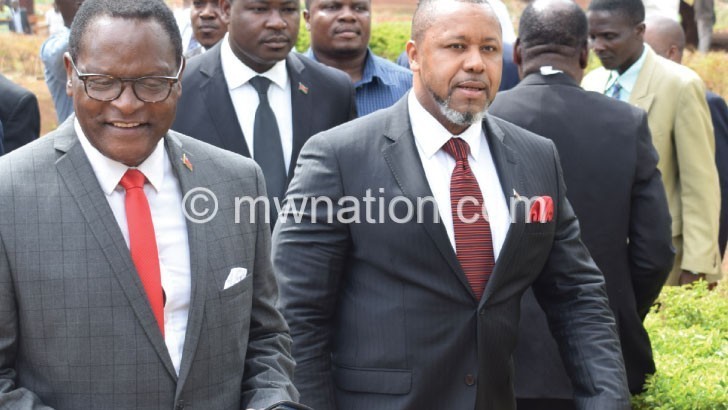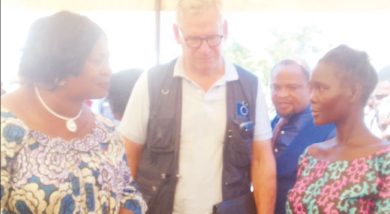UTM Party, MCP talks start today
Representatives of Malawi Congress Party (MCP) and UTM Party officially meet today to discuss a possible electoral alliance ahead of the fresh presidential election tentatively set for May 19 amid sticky issues, notably power sharing and policy.
In separate interviews, officials of the two parties and political commentators on Monday said the manner in which the potential challenges will be resolved may give birth to a political alliance with potential to garner an outright 50-plus-one percent majority.

However, despite confirming that the substantive alliance talks would formally begin today, both sides kept finer details, including agenda, close to their chests.
UTM Party director of publicity Joseph Chidanti Malunga said his party has taken its time in pursuing the possible alliance with MCP because it wanted to understand and assess how the two outfits would blend their manifestos into one common issue to serve Malawians well.
He said: “People think we are in talks already, but we have not been talking. We want to start talking now as we have organised a group that will meet our colleagues on the matter. Basically, we want to resolve some technical issues.”
In a separate telephone interview, UTM Party secretary general Patricia Kaliati, who is leading the UTM technical team, said they hope to agree on key issues with their MCP counterparts.
While feigning ignorance on the meeting with UTM Party, MCP secretary general Eisenhower Mkaka hinted that he was also going to talk to them and that he will communicate subsequent issues.
He said: “There are things that were supposed to be done before the actual meeting. We want the discussion to be comprehensive enough because we are looking at the future of all Malawians.”
To date, MCP president Lazarus Chakwera and his UTM counterpart Saulos Chilima—the duo that secured the landmark judgement by the five-judge panel of the High Court of Malawi sitting as the Constitutional Court that nullified the May 21 2019 presidential election on February 3 2020—has not dropped hints on how they may share power in the event of an alliance.
In the run-up to the annulled presidential election, Chakwera partnered former president Joyce Banda and her People’s Party (PP) as well as the country’s former vice-president Khumbo Kachali and his Freedom Party. The partnership between MCP and the two is still intact.
Talk of the MCP and UTM Party electoral alliance is coming a week after President Peter Mutharika and his Democratic Progressive Party (DPP) unveiled a partnership with United Democratic Front (UDF), a move some commentators have argued exerts pressure on Chakwera and Chilima.
In an interview on Monday, Mzuzu-based political commentator Emily Mkamanga hoped that, if formed, the MCP-UTM alliance would be different from previous partnerships, saying it would be much stronger to attain its aspirations.
She said: “In the past, alliances seemed not to be working because they were meant to be for a short particular period. My suggestion is that they need to have an alliance so that they should work together in the House.”
On whether the alliance could help the two parties to obtain 50-percent-plus-one votes needed for a winning candidate, Mkamanga responded in the affirmative and hoped that the two parties may form the strongest alliance Malawi has ever had.
She said: “In my view, the UTM-MCP alliance may make it if one of the party presidents agrees to be a running mate.”
Political strategist Humphreys Mvula observed that there is a possibility that top leaders from MCP and UTM as well as those from PP and Freedom Party have already been holding a series of secret meetings on power-sharing and blending policy issues in the alliance.
In an interview on Monday, he hinted that the delay in holding crucial meetings and announce their position to supporters was part of the technique of ensuring that officials from both parties were afforded extensive consultations with their grassroots and structures.
Said Mvula: “I am sure that the two parties are building consensus. They are talking to their structures. One thing they want to agree on is the common ideology they should follow. They are also agreeing on key points of their manifesto and what is needed for them.”
Both MCP and UTM Party developed their manifestos which they touted as geared towards bailing Malawians out of abject poverty, drive away deep-rooted corruption and create job opportunities for the youths, among other issues.
The UTM manifesto clearly indicates how it will deal with corrupt leadership, saying that the party shall empower the National Construction Industry Council (NCIC) in the enforcement of the Construction Industry Act and the code of ethics.
The manifesto further hints that the party supports civil society initiatives such as those under the Construction Sector Transparency Initiative (CoST) in working with State enforcement agencies such as the Anti–Corruption Bureau (ACB), the Auditor General and the Office of the Director of Public Procurement (ODPP) to ensure accountability and transparency in awarding contracts.
UTM also promises that the sitting president shall be stripped of immunity so that he or she should be prosecuted whenever found to be involved in corrupt practices while still serving as the State president.
On agriculture, UTM promises a universal fertiliser subsidy with a 50 kilogramme bag pegged at K4 500. The party also promises to introduce mega farms to ensure mass production of crops such as maize, cotton and rice as well as employment.
Further, Chilima passionately pledged to create one million jobs within the first 12 months in office.
In its manifesto which party officials described as a “diagnosis of the problems Malawians are facing and a prescription to the economic and human development ailments Malawians are going through”, MCP focuses on challenges facing the agricultural sector.
Specifically on agriculture, MCP promises farmers a universal subsidy programme which according to officials will see all Malawians regardless of their status having access to cheaper prices of farm inputs.
Both MCP and UTM, through their manifestos, fault the design and implementation of the targeted Farm Input Subsidy Programme (Fisp) which for the past 15 years has been providing subsidised inputs to ultra-poor Malawians.
The two parties speak a similar language, particularly on agriculture and anti-corruption fight drive.
From the economic landscape point of view, both MCP and UTM share some common denominator when it comes to how they intend to fix the economy: they are both ambitious.





